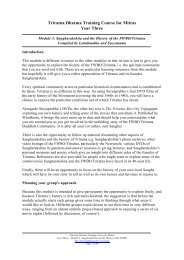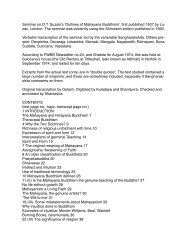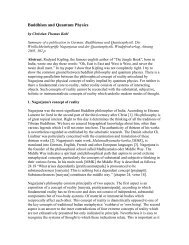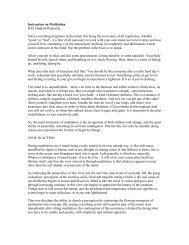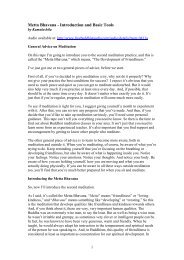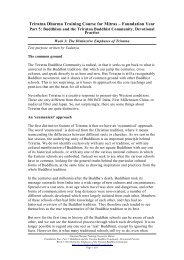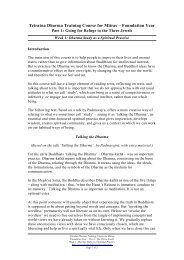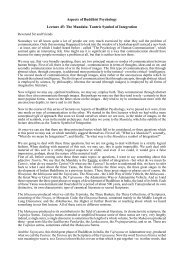Lecture 39: A Western Buddhist Ordination Ceremony Public ...
Lecture 39: A Western Buddhist Ordination Ceremony Public ...
Lecture 39: A Western Buddhist Ordination Ceremony Public ...
You also want an ePaper? Increase the reach of your titles
YUMPU automatically turns print PDFs into web optimized ePapers that Google loves.
<strong>Lecture</strong> <strong>39</strong>: A <strong>Western</strong> <strong>Buddhist</strong> <strong>Ordination</strong> <strong>Ceremony</strong><br />
<strong>Public</strong> <strong>Ordination</strong> conducted by Sangharakshita<br />
Namo Buddhaya<br />
Namo Dharmaya<br />
Namo Sanghaya<br />
Namo nama<br />
Om, Ah, Hum.<br />
(call and response)<br />
We come now as everybody knows to our public ordinations, but not just yet. We’re going to lead up to<br />
them, so to speak, with the Sevenfold Puja and on this occasion, as our usual custom is, there won’t be the<br />
mantra chanting, there’ll be extra, especially appropriate readings. So after the Worship section, there’ll be<br />
the Buddhavagga (?) of the Dhammapada read by Vessantara, and after the Entreaty and Supplication<br />
section, the Magghavagga (?) read by Chakupala (?) and after the Transference of Merits section the<br />
Sukkhavagga (?) read by Jayamati. And after that the public ordinations.<br />
First of all then, the Worship<br />
With mandarava, blue lotus, and jasmine,<br />
With all flowers pleasing and fragrant,<br />
And with garlands skilfully woven,<br />
I pay honour to the princes of the Sages,<br />
So worthy of veneration.<br />
I envelop them in clouds of incense,<br />
Sweet and penetrating;<br />
I make them offerings of food, hard and soft,<br />
And pleasing kinds of liquids to drink.<br />
I offer them lamps, encrusted with jewels,<br />
Festooned with golden lotus.<br />
On the paving, sprinkled with perfume,<br />
I scatter handfuls of beautiful flowers.<br />
Vessantara (…inaudible) [?the section on the enlightened one?]<br />
“That Enlightened One, whose victory is irreversible, and whose skill endless, by what track will you lead<br />
him astray?<br />
( and the whole chapter up to) “He who reverences those who are of such a nature, who moreover are at<br />
peace and without cause for fear, his merit is not to be reckoned as such and such.”<br />
Salutation<br />
As many atoms as there are<br />
In the thousand million worlds,<br />
So many times I make reverent salutation<br />
To all the Buddhas of the Three Eras,<br />
To the Saddharma,<br />
And to the excellent Community.<br />
I pay homage to all the shrines,<br />
And places in which the Bodhisattvas have been.<br />
I make profound obeisance to the Teachers,<br />
And those to whom respectful salutation is due.
Going For Refuge<br />
This very day<br />
I go for my refuge<br />
To the powerful protectors,<br />
Whose purpose is to guard the universe;<br />
The mighty conquerors who overcome suffering everywhere.<br />
Wholeheartedly also I take my refuge<br />
In the Dharma they have ascertained,<br />
Which is the abode of security against the rounds of rebirth.<br />
Likewise in the host of Bodhisattvas<br />
I take my refuge.<br />
REFUGES AND PRECEPTS<br />
Namo Tassa Bhagavato Arahato Samma Sambuddhassa<br />
Namo Tassa Bhagavato Arahato Samma Sambuddhassa<br />
Namo Tassa Bhagavato Arahato Samma Sambuddhassa<br />
Buddham Saranam Gacchami<br />
Dhammam Saranam Gacchami<br />
Sangham Saranam Gacchami<br />
Dutiyampi Buddham Saranam Gacchami<br />
Dutiyampi Dhammam Saranam Gacchami<br />
Dutiyampi Sangham Saranam Gacchami<br />
Tatiyampi Buddham Saranam Gacchami<br />
Tatiyampi Dhammam Saranam Gacchami<br />
Tatiyampi Sangham Saranam Gacchami<br />
Panatipata Veramani Sikkhapadam Samadiyami<br />
Adinnadana Veramani Sikkhapadam Samadiyami<br />
Kamesu Micchacara Veramani Sikkhapadam Samadiyami<br />
Musavada Veramani Sikkhapadam Samadiyami<br />
Surameriya Majja Pamadatthana Veramani Sikkhapadam Samadiyami<br />
Sadhu - Sadhu - Sadhu<br />
With deeds of loving kindness, I purify my body.<br />
With open-handed generosity, I purify my body.<br />
With stillness, simplicity, and contentment, I purify my body.<br />
With truthful communication, I purify my speech.<br />
With mindfulness clear and radiant, I purify my mind.<br />
Confession of Faults<br />
The evil which I have heaped up<br />
Through my ignorance and foolishness -<br />
Evil in the world of everyday experience,<br />
As well as evil in understanding and intelligence -<br />
All that I acknowledge to the Protectors.<br />
Standing before them<br />
With hands raised in reverence,
And terrified of suffering,<br />
I pay salutations again and again.<br />
May the Leaders receive this kindly,<br />
Just as it is, with its many faults!<br />
What is not good, O Protectors,<br />
I shall not do again.<br />
Rejoicing In Merits<br />
I rejoice with delight<br />
In the good done by all beings,<br />
Through which they obtain rest<br />
With the end of suffering.<br />
May those who have suffered be happy!<br />
I rejoice in the release of beings<br />
>From the sufferings of the rounds of existence;<br />
I rejoice in the nature of the Bodhisattva<br />
And the Buddha,<br />
Who are Protectors.<br />
I rejoice in the arising of the Will to Enlightenment,<br />
And the Teaching:<br />
Those Oceans which bring happiness to all beings,<br />
And are the abode of welfare of all beings.<br />
Entreaty and Supplication<br />
Saluting them with folded hands<br />
I entreat the Buddhas in the all the quarters:<br />
May they make shine the lamp of the Dharma<br />
For those wandering in the suffering of delusion!<br />
With hands folded in reverence<br />
I implore the conquerors desiring to enter Nirvana:<br />
May they remain here for endless ages,<br />
So that life in this world does not grow dark.<br />
The Section on The Way<br />
“The best of ways is the Eightfold Way. The best of truths are the Four Truths …..(and the whole chapter<br />
up to) ….the way leading to Nirvana.”<br />
The Heart Sutra<br />
The Bodhisattva of Compassion,<br />
When he meditated deeply,<br />
Saw the emptiness of all five skandhas<br />
And sundered the bonds that caused him suffering.<br />
Here then,<br />
Form is no other than emptiness,
Emptiness no other than form.<br />
Form is only emptiness,<br />
Emptiness only form.<br />
Feeling, thought, and choice,<br />
Consciousness itself,<br />
Are the same as this.<br />
All things are the primal void,<br />
Which is not born or destroyed;<br />
Nor is it stained or pure,<br />
Nor does it wax or wane.<br />
So, in emptiness, no form,<br />
No feeling, thought, or choice,<br />
Nor is there consciousness.<br />
No eye, ear, nose, tongue, body, mind;<br />
No colour, sound, smell, taste, touch,<br />
Or what the mind takes hold of,<br />
Nor even act of sensing.<br />
No ignorance or end of it,<br />
Nor all that comes of ignorance;<br />
No withering, no death,<br />
No end of them.<br />
Nor is there pain, or cause of pain,<br />
Or cease in pain, or noble path<br />
To lead from pain;<br />
Not even wisdom to attain!<br />
Attainment too is emptiness.<br />
So know that the Bodhisattva<br />
Holding to nothing whatever,<br />
But dwelling in Prajna wisdom,<br />
Is freed of delusive hindrance,<br />
Rid of the fear bred by it,<br />
And reaches clearest Nirvana.<br />
All Buddhas of past and present,<br />
Buddhas of future time,<br />
Using this Prajna wisdom,<br />
Come to full and perfect vision.<br />
Hear then the great dharani,<br />
The radiant peerless mantra,<br />
The Prajnaparamita<br />
Whose words allay all pain;<br />
Hear and believe its truth!<br />
Gate Gate Paragate Parasamgate Bodhi Svaha<br />
Gate Gate Paragate Parasamgate Bodhi Svaha<br />
Gate Gate Paragate Parasamgate Bodhi Svaha
Transference of Merit and Self-Surrender<br />
May the merit gained<br />
In my acting thus<br />
Go to the alleviation of the suffering of all beings.<br />
My personality throughout my existences,<br />
My possessions,<br />
And my merit in all three ways,<br />
I give up without regard to myself<br />
For the benefit of all beings.<br />
Just as the earth and other elements<br />
Are serviceable in many ways<br />
To the infinite number of beings<br />
Inhabiting limitless space;<br />
So may I become<br />
That which maintains all beings<br />
Situated throughout space,<br />
So long as all have not attained<br />
To peace.<br />
The Section on Happiness<br />
“Happy indeed we live, friendly amid the hateful… (and the whole chapter up to) ….the ideal man, the<br />
truly wise as the moon follows the path of the stars.”<br />
Well with those words of the Buddha from the Dhammapada we come to the public ordinations, as we call<br />
them. I said a few words at the beginning of the week about the significance of the private ordination,<br />
stressing that it represented one’s individual, even solitary going forth from the group, going forth which<br />
one was prepared to undertake even if nobody else took that step.<br />
Well today we see, so to speak, the other side of that coin. And the other side of the coin consists in the<br />
fact that though one was ready, though one was prepared to go it alone, fortunately and happily one doesn’t<br />
in fact have to go it altogether alone. One has to still go it alone in the sense that as this last chapter of the<br />
Dhammapada stressed we ourselves have to make the effort, but we make the effort in company with others<br />
who are also making the effort, who have also gone forth, who have also taken Refuge, who are also trying<br />
to be individuals, who are also trying to be ideal men.<br />
So that fact is represented by the public ordination. That is in fact the public ordination. Having taken the<br />
step of going for refuge alone, having perhaps sort of closed your eyes and just taken that step almost in the<br />
dark, when you open your eyes you find yourself surrounded by a whole host of people who have also<br />
taken that step, so that by virtue of taking that step as an individual you become a member of a spiritual<br />
community of individuals, or at least of those who are aspiring to individuality.<br />
So this is what is happening this morning, in the case of those who’ve had their private ordination, they’re<br />
as it were opening their eyes and looking round and finding themselves in the midst of the spiritual<br />
community, in the midst of the sangha.<br />
So I’m going to ask them now to come forward one by one. I think they’ll come forward in their order of<br />
former mitra seniority and make the traditional offerings.<br />
First of all the flower, representing impermanence. The flower represents impermanence for obvious<br />
reasons because as probably the organiser knows better than anybody else flowers don’t last very long.<br />
They have to be replaced and renewed. So one could say that the understanding of impermanence is the<br />
first real step on the spiritual path.
And then of course the offering of the light, in this case the candle, representing the light of wisdom shining<br />
in the midst of the darkness of the world.<br />
And finally the stick of incense representing the fragrance literally of the good life as it spreads in all<br />
directions influencing in a positive manner all of those with whom it comes into contact.<br />
And of course you notice the flower is white, as is the candle, and that has its own significance, white<br />
representing purity.<br />
There is a passage in one of the sutras where the Buddha says, Just as a perfectly clean white cloth takes the<br />
dye, you know, immediately, so in the case of someone of purified mind, he takes the dye so to speak of the<br />
teaching immediately. In that way Insight arises.<br />
So whenever one makes these three traditional offerings, whether today or on any other future occasion,<br />
one should reflect on their significance you know in this manner. They should never become mere as it<br />
were formalities.<br />
[break!]<br />
Now follow some verses which give expression to the general significance of the ceremony, so I’m going to<br />
ask all those being ordained just to repeat these words after me.<br />
Bowing before the Buddha, I purify my body.<br />
Chanting the sacred mantras, I purify my speech.<br />
Silently meditating, I purify my mind.<br />
So once again there’s an emphasis on purification, because when body, speech and mind have been<br />
thoroughly purified, they become the body, speech and mind of the Buddha, you could say, the three kayas.<br />
Then comes the ordination proper, that is to say, the Going For Refuge, the Taking of the Ten Precepts.<br />
But before that, as everybody is aware, there comes something which is also important, and that is the<br />
request. One has to ask, because the going for refuge is what you want to do. So you ask in these Pali<br />
words, repeating altogether.<br />
[tape 2 breaks here near the beginning of the following word]<br />
Aham Bhante, tisaranena, saha, dharmachari - samvara - silam dhammam yacami. Anugaham katva silam<br />
[tape 1 breaks here in the middle of the following word] detha me Bhante<br />
Which means, Bhante, I wish to take the Three Refuges together with the Dharmachari ordination vows.<br />
Kindly give them to me, Bhante.<br />
Then I say<br />
Yamaham vadami tam vadetha.<br />
Which means, Repeat whatever I say. And they all say, Ama, Bhante<br />
Then follow the Refuges and Precepts preceded by the Salutation to the Buddha. We salute the Buddha<br />
before taking the Refuges and Precepts as an expression of gratitude, inasmuch as it is from the Buddha that<br />
this whole tradition of Going For Refuge, taking the Precepts, practising the Dharma, comes down.<br />
(Refuges)<br />
Then at this point comes a question. I say,<br />
Tisaranagamanam sampunnam?<br />
Which means, Are the Three Refuges complete? Have you gone for Refuge fully and sincerely?
And you say, Ama Bhante.<br />
Then follow the Precepts.<br />
(Ten Precepts in Pali in negative form)<br />
Then come some verses which represent, not a literal translation of the Ten Precepts, but their inner<br />
meaning, their spirit as it were, or what one will be really trying to practise or observe as an Order Member.<br />
So just repeat these words also after me.<br />
(Ten Precepts in English in positive form)<br />
Then I say, Tissaranena saha dharmachari - samvara - silam dhammam sadhukam surakkhitam katva<br />
appamadena sampadetha.<br />
Which means, Having well observed the Three Refuges and the Dharmachari ordination vows, with<br />
mindfulness, strive on. Appamadena sampadetha. According to the Pali Canon, the Buddha’s last words.<br />
Appamadena, with mindfulness, with awareness, in the full sense of the term, Sampadetha, which literally<br />
means Strive Thou. Or, with mindfulness, strive. As if the Buddha, on the eve of his Parinirvana, wanted<br />
to summarise his whole teaching in just these two words. As if to say, if only you remain mindful all the<br />
time, mindful in body, speeech and mind, from minute to minute, which isn’t easy as everybody knows, and<br />
if you continue to make an effort, even if you make a mistake, never mind, continue to make an effort; if<br />
you fall down, pick yourself up, carry on, continue to make an effort, never give up, never give in, if you<br />
can just practise these two things, remaining constantly aware and always making an effort, then success is<br />
assured, you’ll get there in the end, perhaps sooner rather than later.<br />
So that’s the main part of the ordination, but there are still a few things left. And as you will have noticed<br />
there has been this emphasis on purification all the way through and it’s even reflected in a sartorial manner<br />
to some extent one might say.<br />
So what follows now continues the emphasis, because I’m going to ask each of the ordinees to come<br />
forward one by one and receive a few drops of water on the crown of the head, the symbol of which<br />
probably is obvious. In Indian tradition the crown of the head represents the highest part of one’s being, not<br />
only literally but metaphorically. It’s that highest part of one’s being where one contacts the Dharma,<br />
where one, one might say literally, contacts the Dharma. And just as having contacted the Dharma that<br />
influence of the Dharma spreads throughout one’s whole being, in the same way having received so to<br />
speak the few drops of water on the crown of one’s head, the whole being gradually becomes purified.<br />
So this is what it represents, what it symbolises. It’s also reflected one might say in the Vajrasattva Mula<br />
Yoga, with which some of you must be familiar.<br />
So I’ll ask …(?) to come forward one by one and receive the few drops of water.<br />
All right, we still haven’t finished because I believe there’s something underneath here!<br />
And once again of course the emphasis on purity and purification. And on either side of the kesa of course<br />
you can see the emblem of the Order. I don’t know whether everybody understands exactly what it<br />
represents, but we have of course the Three Jewels. The yellow jewel is the Buddha, the blue jewel is the<br />
Dharma and the red jewel is the Sangha. And they rest on a pure white moon mat representing the purified<br />
mind, which in turn rests on a red lotus flower, the lotus flower of the heart, also the red lotus flower of<br />
Amitabha, the Buddha of the West. And the Three Jewels emit flames. They’re blazing, as it were.<br />
They’re blazing and they’re destroying the darkness of the world, not only destroying the darkness but<br />
burning up so to speak all the impurities with which they come into contact.<br />
So I’m going to ask now the Order Members, as they are, to come forward one by one. And of course<br />
according to tradition, if one wants to be very strict, then it’s at the moment that the kesa is put round one’s
neck or in the case of bhikku ordination the belt, that one becomes in all senses, in the full sense of body,<br />
speech and mind, ordained.<br />
And of course Order Members wear their kesas on all suitable occasions, for puja, meditation, taking a<br />
class, giving a lecture, whenever it seems suitable.<br />
At first Order Members, new Order Members I mean, feel a little self conscious for a few minutes, but I<br />
believe you very quickly get used to it and it’s as though you’ve been wearing your kesa for hundreds of<br />
years.<br />
Perhaps I should also explain that kesa is a Japanese corruption of the Sanskrit word Kashaya (?) which<br />
means simply the robe, it’s a sort of abbreviated robe, one might say.<br />
Also perhaps I should mention that I’m sure at this very moment Order Members and mitras and friends all<br />
over the world are thinking of us. I believe the information about the ordinations, both private and public,<br />
was relayed to all the different Centres last week, so they all will have been mentally following events here<br />
at Il Convento with very keen interest, and will be I’m sure keenly awaiting certain information.<br />
I’m afraid kesas come all in the same size! We’ll have to give some thought to that!<br />
Well we haven’t quite finished, there’s still one or two items to be gone through and first of all of course<br />
there’s the question of the names. Each new Order Member of course received a name at the time of the<br />
private ordination and at this stage in the proceedings we usually announce the names and give a general<br />
idea about its significance. So let me go through the list.<br />
The former, or ex-Derek Goodman becomes Sasanaratna. Now Sasana’s a new one. Sasana is a quite an<br />
important <strong>Buddhist</strong> term. I think I have spoken about it more than once in the course of seminars. Sasana<br />
means the whole teaching of the Buddha, the whole movement if you like set in motion by the Buddha in<br />
its as it were more practical even organisational aspect. Though it isn’t a literal translation ‘movement’<br />
would actually be quite good. The Buddhasasana is the Buddha’s movement, the Buddha’s spiritual<br />
movement. Literally it comes from a root meaning to direct, or even to announce, or to lay down like<br />
laying down a law, but the literal meaning doesn’t really help us very much here. It’s what the Buddha<br />
proclaims and it’s the following of that proclamation, it’s all those who follow it and every way in which<br />
they follow it, in other words as I’ve said the Buddha’s spiritual movement. So Sasanaratna means not just<br />
that that movement itself is a ratna which of course it is, it’s something infinitely precious, but that the<br />
person bearing that name is so to speak a jewel in himself, a jewel of the Sasana. And of course everybody<br />
knows the ex-Derek is a jewel, but now of course he’s a jewel of the Sasana, he’s Sasanaratna. So that’s<br />
the name by which he’ll be known within the Movement in future, Sasanaratna.<br />
Then the former Alan Turner, he becomes Sasanajyoti, the light of the Sasana. The Sasana itself gives<br />
light, the Sasana itself, the Buddha’s teaching, the Buddha’s spiritual movement, is a sort of light to the<br />
world, but the person bearing the name, Sasanajyoti himself illuminates the Buddha’s Sasana, the Buddha’s<br />
movement, by practising it and teaching it, so the former Alan Turner becomes Sasanajyoti.<br />
Then we move on to Colin Lavender, the former Colin Lavender, who becomes Sumangala. Mangala<br />
means auspicious, especially in the spiritual sense, as in The Mangala Sutta, where the Buddha enumerates<br />
thirty-two auspicious signs, which are auspicious in the sense that if you see them in yourself, in your life,<br />
you can know that you’re advancing spiritually. So to advance in that way, to be a Mangala, to observe or<br />
practise the Mangala, this is obviously a very happy thing, so Sumangala, which means the, you could<br />
translate it roughly as happily auspicious, or the happily auspicious one, and what could be more<br />
auspicious, or more auspiciously happy, than committing oneself to the Buddha, Dharma and Sangha,<br />
committing oneself to the spiritual life? So Sumangala.<br />
And then the former Peter Nicholson, he becomes (a nice short one, I think this is the shortest name this<br />
year) Sunanda, the happily delighting one, or happily delighted one. He delights himself, he delights<br />
others, he’s happily delighted because he’s delighting in the Dharma, and what could be a greater delight
than that? So Sunanda.<br />
Then with the next few names we strike a rather vigorous note! I thought it wouldn’t be a bad idea if we<br />
emphasised perhaps the more heroic qualities in the Movement and in the Order. I believe there has been a<br />
little - I won’t say whisper of criticism - but a little suggestion, let us say, that in the course of these<br />
Tuscanies we direct our energies more specifically really to turning out young heroes, you know, young<br />
Bodhisattvas who are ready to go straight back into any situation, however demanding. So that obviously<br />
requires very positive, heroic qualities. So I thought perhaps it would be a good idea to have one or two<br />
names which, you know, stressed something very positive and heroic indeed, and I’ve fallen back so to<br />
speak on one of the names or titles of the Buddha, which is Jina. The Jina is the conqueror. We usually<br />
think of the Buddha as the Buddha, which is in a way a bit, I won’t say one-sided because how can<br />
Buddhahood be one-sided, well we mustn’t forget that in the <strong>Buddhist</strong> scriptures the Buddha is known by<br />
all sorts of other names. He’s the Tathagatha. He’s Bhagwan. He’s Alokajesta (?). He’s the Sugata. He’s<br />
the Charioteer of gods and men. He has all sorts of titles, and among others he has the title of the Jina,<br />
which means the Conqueror, the one who has conquered mundane existence. So it’s not a bad idea if we<br />
think of the spiritual life in terms of conquest, spiritual conquest of course. Dharmavijaya.<br />
So I thought therefore it wouldn’t be a bad idea, in fact it would seem quite appropriate, for the ex-Tommy<br />
McLeary(?), to be Jinaraja. So Jinaraja means the King Conqueror, or the conqueror who is king. And I’d<br />
like to point out here that we have in a way two notions coming together. We’ve got one might saying the<br />
love mode represented by the Jina who is the Buddha and raja representing the power mode and these come<br />
together. If you’re going to function in the world you need power in a sense, you need energy, you need<br />
strength, even in the ordinary, mundane sense, you need money, for instance. But that must all be guided<br />
and directed and governed by the love mode, by the principle of enlightenment. So here we see these two<br />
coming together, so Jinaraja.<br />
And then the former Duncan Steen (?) he becomes Jinananda. You get in a way reality principle and<br />
pleasure principle! We mustn’t forget the pleasure principle after all the study we’ve done on it, and what<br />
could be a greater source of bliss than Buddhahood, Jinahood as we should perhaps also say, so he becomes<br />
Jinananda, the bliss which comes from spiritual conquest.<br />
And then the former Alan Pendock (?), he becomes Jinapalita, the one who is protected by the Jina,<br />
protected by the conqueror, and what better or greater protection could one have than that?<br />
All right, moving on to the next group. Again we have a rather vigorous emphasis with the new name of<br />
the former Kevin Donovan. He becomes Moksharaja. Moksha meaning liberation, emancipation, freedom,<br />
and raja of course king. And again here you have, you could say the love mode, the spiritual principle, the<br />
transcendental principle, and the power mode, you know, coming together.<br />
Similarly with the next name which is that of the former Ong Sin Tyung (???) Manjuraja. Well you’ve got<br />
in a way two real opposites coming together here. Manju means gentle, as in Manjughosha, the gentle<br />
voiced one, he’s gentle, soft, delicate, but not in the ordinary sense. It doesn’t mean weak, it doesn’t mean<br />
effeminate or anything like that. It’s Manju in the sense that inasmuch as it’s a spiritual principle operating<br />
entirely by the love mode there’s nothing forcible, there’s nothing violent, it’s all so to speak gentle.<br />
Though of course that gentleness is very strong. So it’s Manjuraja, so raja obviously represents power,<br />
energy, authority. So one has got these two things coming together. Outwardly perhaps one needs to be<br />
firm, you know, self-confident, bold, decisive, independent, but not on a basis of egotism or assertiveness,<br />
but on a basis of spiritual gentleness, so Manjuraja.<br />
Then the next two names represent a bit of a departure in a way because the former Gert Bak (?) becomes<br />
Shantipada. We haven’t had before any Order names ending in ‘pada’. Pada is a word of quite rich<br />
meaning. It’ s the same pada as we get in Dhammapada. It can mean a footprint or a step. It can mean a<br />
syllable. And also it can mean a place or state. So Shantipada basically means ‘the place or state or even<br />
abode of peace’, or ‘one who has peace, Shanti, as his abode, or for his state’.<br />
And similarly, last of all, we have the former Paul Posa in the same way Maitripada. Maitri of course
meaning metta, loving kindness, the Sanskrit form of the word, pada in the same way the place or state.<br />
The place or state of loving kindness or the one who has loving kindness in the highest sense for his place<br />
or state.<br />
And both Shantipada and Maitripada are names of well-known Siddhas in the late Indian <strong>Buddhist</strong> period,<br />
usually called Shantipa and Maitripa for short, but I think we’ll stick to pada - maybe when they’re a bit<br />
older they’ll be Shantipa and Maitripa!<br />
So we’ve got this galaxy of new names, new Order Members, new individuals, Sasanaratna, Sasanajyoti,<br />
Sumangala, Sunanda, Jinaraja, Jinananda, Jinapalita, Moksharaja, Manjuraja, Shantipada and Maitripada.<br />
So no doubt it’ll take you a few days to get used to them and accustomed to call one another by them and<br />
being called by them, but no doubt by the time the retreat ends we’ll be thoroughly accustomed to them.<br />
So that is really about all. There just come at the very end some verses to be recited by the new Order<br />
Members, giving expression to their wholehearted acceptance of the ordination. After that I repeat or recite<br />
some verses of blessing, invoking the blessing of the Buddha, Dharma and Sangha on all of them on the<br />
occasion of their entry into the Order, after that there’ll be a threefold shout of Sadhu from all present and<br />
then the old Order Members as we must now call them will get up and leave, leaving the new Order<br />
Members just to sit quietly together for a few minutes. After that I believe there’ll be some photographs<br />
outside.<br />
But first of all these verses of the acceptance of the ordination and then the verses of blessing.<br />
Would just those who’ve been ordained repeat after me these verses.<br />
For the attainment of enlightenment<br />
I accept this ordination<br />
For the benefit of all beings<br />
I accept this ordination<br />
In harmony with friends and brethren<br />
I accept this ordination<br />
With loyalty to my teachers<br />
I accept this ordination.<br />
Bhavatu sabbamangalam rakkhantu sabbadevata<br />
Sabbabuddhanu bhavena sada sotthi bhavantu te<br />
Bhavatu sabbamangalam rakkhantu sabbadevata<br />
Sabbadhammanu bhavena sada sotthi bhavantu te<br />
Bhavatu sabbamangalam rakkhantu sabbadevata<br />
Sabbasanghanu bhavena sada sotthi bhavantu te.<br />
Sadhu! Sadhu! Sadhu!<br />
Good.



